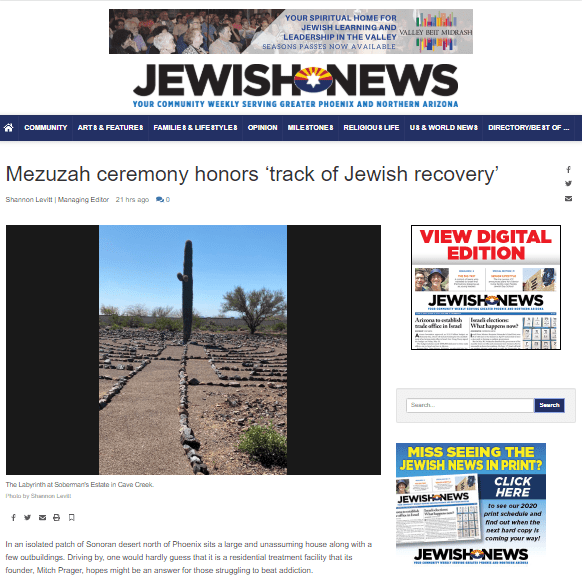In the News
Jewish News | Shannon Levitt Managing Editor
In an isolated patch of Sonoran desert north of Phoenix sits a large and unassuming house along with a few outbuildings. Driving by, one would hardly guess that it is a residential treatment facility that its founder, Mitch Prager, hopes might be an answer for those struggling to beat addiction.
But had this been an option years ago, this is just the kind of place that might have saved Prager’s brother and dear friend, who both died of their addictions and who are the inspiration for his efforts.
After touring roughly 50 residential treatment centers around the country, Prager has come to understand that while there’s no panacea, providing enough types of therapy is key. He said the recovery “magic” might happen in art class, working with horses, walking in a labyrinth or even in plain old traditional therapy. He decided his facility would have them all.

Memorial bench at Soberman's Estate in Cave Creek.
Soberman’s Estate opened a year ago replete with psychiatrists, medical and nursing staff, as well as all the therapies that Prager found in his research. His brother died of an overdose, and his longtime friend died by suicide after a brief stint of sobriety. Those experiences, as well as his own struggle with alcoholism, taught Prager first-hand what addiction does to people and how difficult it is to overcome. Prager saw a way he could help others by building a facility with an all-hands-on-deck approach.
Five adult men are in residence at Soberman’s now, and the plan was to have 10 by this summer. The clients tend to be a bit older, and the population is kept at a minimum to develop sophisticated individual programs. The lack of women in the house is, Prager says, a way to keep the men focused and able to open up.
Although Prager and the men who inspired Soberman’s are Jewish, it is not a religious place, but it is spiritual.





